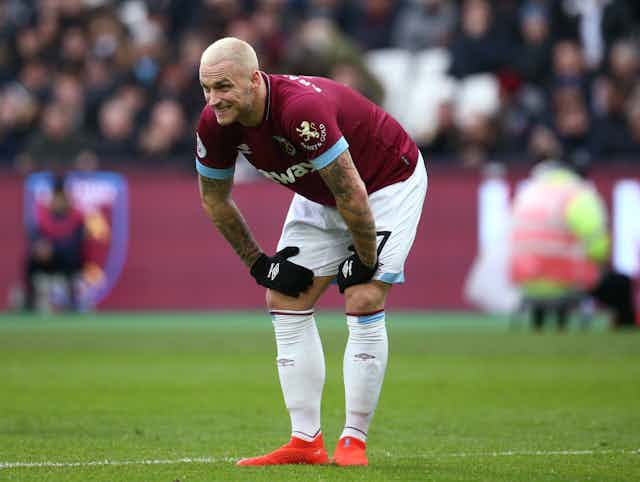Football fans love a rumour. With the transfer window in various parts of the world currently open for players to switch clubs, this means click-bait stories are currently cluttering the world’s media outlets.
None more so than the “Arnautovic to China” gossip, which has caused speculation that English Premier League club West Ham United’s Austrian international Marko Arnautovic is heading east in a multi-million pound deal with last season’s Chinese Super League (CSL) winners, Shanghai SIPG.
If stories are to be believed, the Shanghai club’s opening gambit was a £35m bid, though subsequent rumours have surfaced that the Austrian’s agent (also his brother) is pushing for a deal worth in the region of £45m. West Ham fans in particular have taken to social media in their droves, debating whether Arnautovic is worth it, should West Ham keep him, and whether the prospective Chinese buyers have more money than sense.
Such chatter is, however, the stuff of fantasy football and content hungry newspapers. It’s far more likely that Arnautovic’s brother is merely alerting the market to the player’s potential availability and to his desire for a big pay cheque.
There’s nothing new in this as, with each passing transfer window, signals and rumours often cause more excitement than many of the player signings themselves. In this instance, though, it is mention of Shanghai that is the surprise.
Stemming the flow
Four years ago, President Xi Jinping had just proclaimed his desire for China to become one of the world’s leading football nations. This sparked a transfer frenzy among Chinese Super League clubs, resulting in players from Europe and South America moving there for big transfer fees and large wage packets.
But the greed of overseas players allied to the ill-judged speculation of Chinese investors was of considerable concern to the government in Beijing. Not only was there a sense that foreigners were taking advantage of China, more generally there were worries about overseas currency flows and troubling economic data that showed the country’s growth was slowing.

Under instruction from the authorities, the Chinese Football Association thus set about introducing measures aimed at stemming the flow of what some had labelled “overseas mercenaries” into China’s football clubs.
The first of these involved the imposition of limits to the number of foreigners in a club’s playing squad. For Arnautovic, this remains an important detail that somewhat undermines the stories about his impending arrival out east. SIPG already has its full quota of four overseas players, and can’t sign any more unless they sell someone else first. For the time being at least this doesn’t look likely.
And then there’s the not insignificant matter of tax. Following ludicrously extravagant spending by Chinese clubs on overseas players with questionable motives (and talents), a state tax was imposed on such signings. At one level, its introduction was framed in economic terms: only loss making CSL clubs need to pay the tax. The issue remains: these clubs typically don’t make a profit, consequently they face a 100% levy on any signings of foreigners such as Arnautovic.
In these terms, stories about a £45m SIPG deal for him beg the question: is that including or excluding the tax? If it’s the latter, then were there any substance to the gossip, football is on the cusp of its fourth most expensive player in transfer history. For those who know anything about Arnautovic, this could well make them wince.

And should any of the parties to all of this be looking for ways of engaging in tax avoidance, they are best reminded of last year’s move by Congolese international Cedric Bakambu from Spain’s Villareal to Beijing Guoan. The Chinese government quickly, and successfully, closed any loopholes when the clubs involved sought ways of getting out of the payment.
China first
It is therefore not unreasonable to speculate that Marko Arnautovic’s proposed move to Shanghai will not happen. But if it does, it will likely be for a fee that is considerably less than social media’s various communities have been discussing.
Even then parties to a deal would need to satisfactorily navigate through the CSL’s maximum wage regulations, standardised player contracts and ongoing, stringent state controls that remain in place to prevent capital flight from China. Agreeing a deal is one thing, actually getting the money out of China is another.
Beyond the economics, Chinese officials are determined that whatever money is spent in football it should benefit the country’s national teams. The free-market frenzy of four years ago cost the country dearly but delivered very little. Now, revenues collected from the player tax are being spent on domestic football development activities.
Furthermore, the rapidly developed governance system now encircling Chinese football is not simply regulation for regulation’s sake. Rather, it is founded on the notion of “China first”, and a desire for the country’s national teams to compete alongside the world’s best.
As such, while overseas players and their agents might anticipate a financial windfall by moving to China, the reality is considerably different. In the eyes of Xi and his officials, “Arnautovic to China” is presumably seen as being of little benefit to their World Cup aspirations. Hence for this reason, eye-watering multi-million pound moves are unlikely to happen again any time soon.

